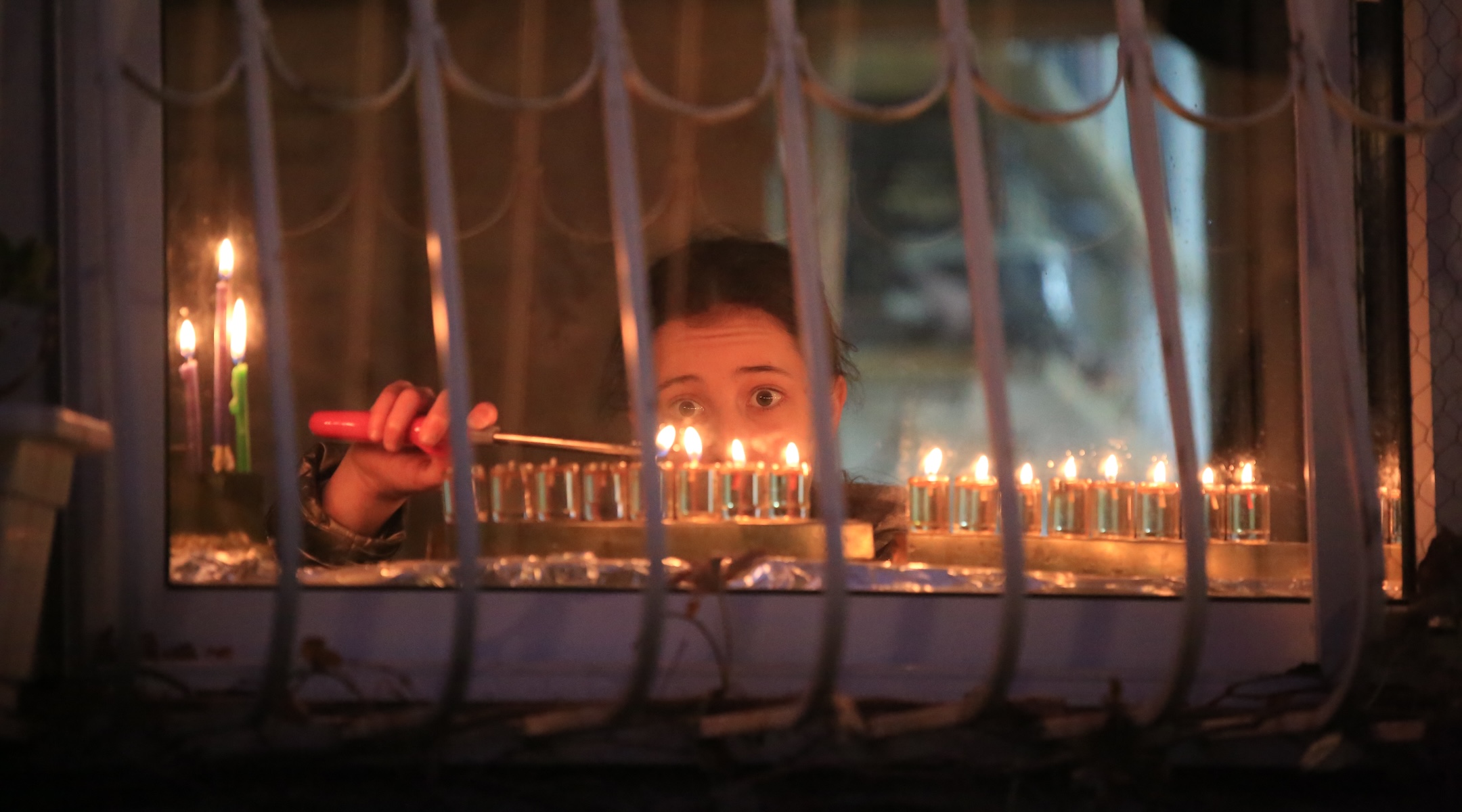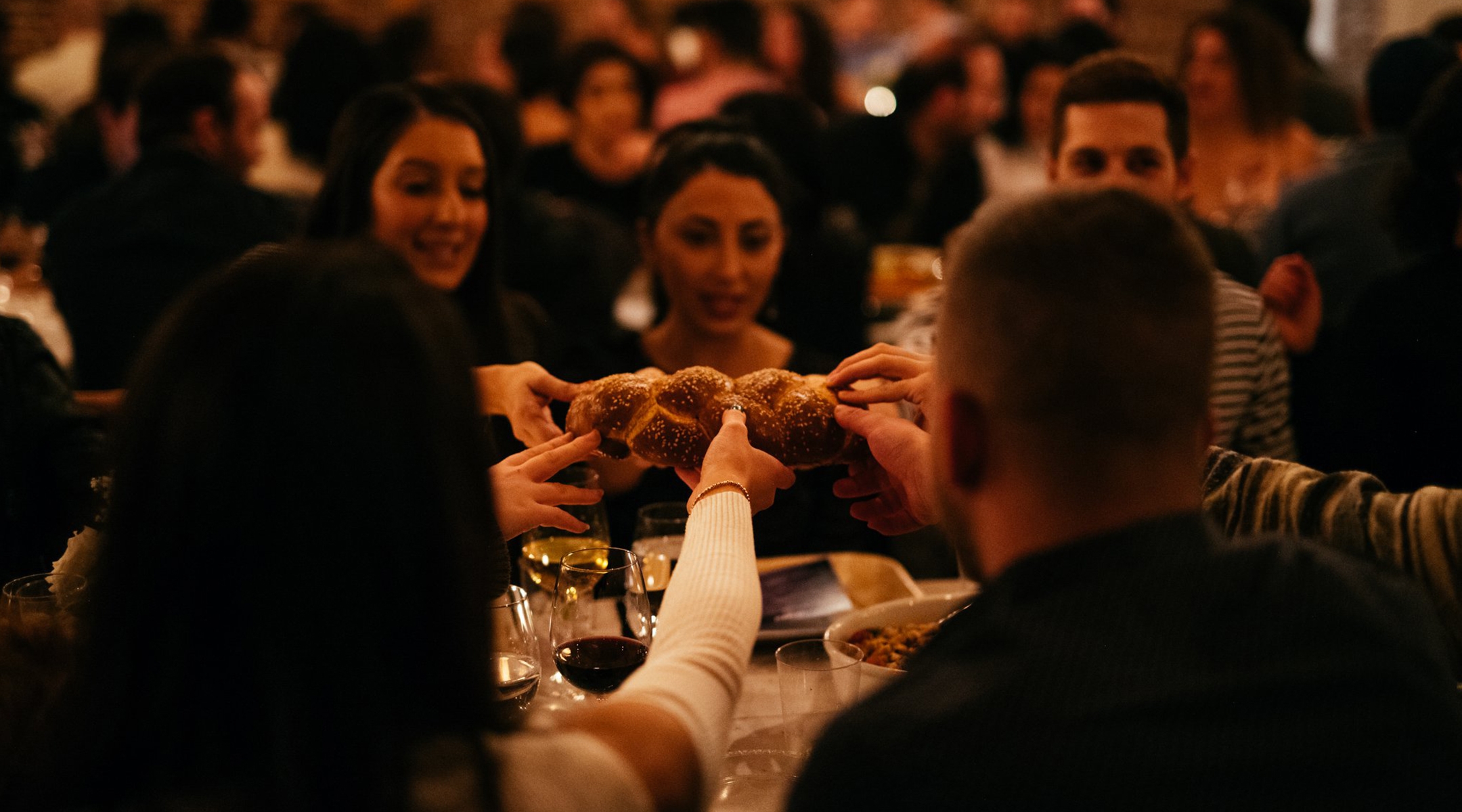‘All about light overcoming darkness’: How US Jews are celebrating Hanukkah with Israel at war
From Los Angeles to New York, many Hanukkah events are drawing connections between the holiday and the ongoing war in Israel

Ultra-Orthodox Jewish men light candles on the seventh night of Hanukkah in the Jewish Quarter of Jerusalem, Sunday, Dec. 25, 2022. (Saeed Qaq/NurPhoto via Getty Images)
(JTA) — When tickets for Los Angeles’ Infinite Light Festival went on sale in October, just a week after Hamas’ brutal attack on Israel, sales were brisk. In fact, tickets sold out to the annual Hanukkah celebration held by the local Jewish federation’s young adult division, NuRoots, faster than in any other year.
“I truly believe that that’s because people are just craving to be in community, to celebrate, to be given permission to have a sense of joy, and to show up and have fun,” Chelsea Synder, vice president of NuRoots Community, told the Jewish Telegraphic Agency.
Joy has felt hard to come by in Jewish communities since Oct. 7, as grief, fear and anxiety have been the prevailing emotions in the wake of the attack, Israel’s counteroffensive in Gaza and a global explosion of antisemitism. Yet the arrival of Hanukkah — the first holiday since Simchat Torah, the date of the assault — has required Jews and their communities to figure out how to balance sadness and celebration.
For many, the symbolism of Hanukkah offers a handy way to thread the needle.
“It’s a difficult time, but Hanukkah is all about light overcoming darkness,” said Rabbi Aryeh Kaltmann, a Chabad-Lubavitch emissary in Columbus, Ohio.
Hanukkah is a major event for Chabad, which is known for its public displays of Jewish practice surrounding holidays. The movement’s rabbis organized what it said were more than 15,000 public menorah lightings last year, including what its teen network said was the first-ever Hanukkah candle lighting at an NFL “Sunday Night Football” game.
Kaltmann has put together an expansive program called “Eight Nights of Fun” that includes someone dressed as Judah Maccabee skydiving from an airplane to light a menorah, a cannon shooting edible dreidels, a menorah lighting at a Columbus Blue Jackets NHL game and more. The over-the-top agenda was by design.
“The more we could do to bring out celebration and unity between Jewish kids and the community, the better,” Kaltmann said.
“Although it’s hard to celebrate Hanukkah when we know that there are brothers and sisters who are in prison for no crime of their own, just because they happen to be Jewish… we can ignite hope and love and a sense of camaraderie,” he added, referring to the 138 people still held hostage by Hamas in Gaza. “When we do a good deed, that joy and that celebration can make a difference for our brothers and sisters in Israel.”
While Kaltmann’s plans are a turbocharged version of what he does every year, the war has given rise to a new set of just-for-wartime Hanukkah plans as well. A fundraising campaign called “Light of Strength” aims to raise $3.5 million to send Hanukkah gift cards to 75,000 Israeli children who have been displaced from their homes.
“When we think of Hanukkah, we think of the lights of Hanukkah, right? Bringing light into the darkness,” said Tali Reiner Brodetzki, an Israeli who lives in Pennsylvania and is leading the campaign. “A lot of the Hanukkah songs are about this: getting rid of the darkness, bringing light and joy. And this is what it’s all about — bringing light and joy to these kids’ lives.”

Young Jews celebrate Shabbat during the 2022 Infinite Light Hanukkah festival in Los Angeles. (Courtesy of NuRoots)
In New York, UJA-Federation is hosting a handful of Hanukkah events that also draw a direct connection to the war. Its Dec. 7 “Evening of Music and Light” is a benefit concert for Israel, while the event page for its Dec. 12 candle lighting reads: “With our focus on the war in Israel and the rise in antisemitism, most of us are seeking the comfort of our community and a reprieve from the alarming headlines.”
Those alarming headlines have included a spike in reported antisemitic incidents that have some Jews wary of showcasing their Jewish identity in public — a key requirement of the holiday. Adam Kulbersh, an actor and father in Los Angeles, launched the “Project Menorah” initiative to encourage non-Jews to display menorahs in their windows out of solidarity.
“We’re in a time of awful antisemitism, historic levels,” Kulbersh told JTA. “I think the idea of inviting our non-Jewish allies to add their light to ours in a time of darkness has really moved people.”
Some Jews who oppose the war are using the holiday to call attention to their cause. A group called Rabbis for Ceasefire is holding a Hanukkah candle-lighting in New York City on the first night of the holiday, for example.
But even as war and loss have reshaped some Hanukkah events, many others are proceeding largely along the same lines as they have in the past — with raucous fun layered upon a history that has included struggle and overcoming great odds.
In Charlotte, North Carolina, the local Chabad is hosting “Unite with Light: A Jewish Solidarity Chanukah Concert” with American-Israeli singer Nissim Black. The Bronx Jewish Center is also holding a Hanukkah concert with the Jewish a capella group The Maccabeats. The Chicago Loop Synagogue will put on a performance of “Hershel & the Hanukkah Goblins,” a story about a man who outsmarts a procession of goblins and saves the holiday for one shtetl.
And in Los Angeles, where NuRoots has planned a full slate of events to engage young Jews during the holiday — including L.A.’s sizable Israeli population — Snyder said the focus is on bringing the community together during “our darkest moments,” as the event page puts it.
“Hanukkah is the symbol of hope,” she said. “I think all of us can really lean into what hope means for us, regardless of how you affiliate yourself politically. I think the world is hard. And I think that hope and light and this idea of celebrating and coming back to joy, and donuts and latkes, it makes us connected on a level that’s deeper than ourselves.”
This article originally appeared on JTA.org.
A message from our Publisher & CEO Rachel Fishman Feddersen

I hope you appreciated this article. Before you go, I’d like to ask you to please support the Forward’s award-winning, nonprofit journalism so that we can be prepared for whatever news 2025 brings.
At a time when other newsrooms are closing or cutting back, the Forward has removed its paywall and invested additional resources to report on the ground from Israel and around the U.S. on the impact of the war, rising antisemitism and polarized discourse.
Readers like you make it all possible. Support our work by becoming a Forward Member and connect with our journalism and your community.
— Rachel Fishman Feddersen, Publisher and CEO






















